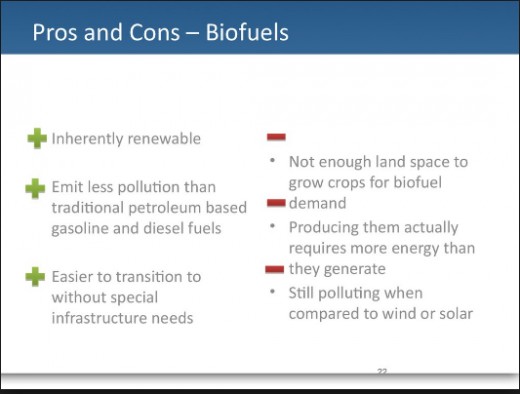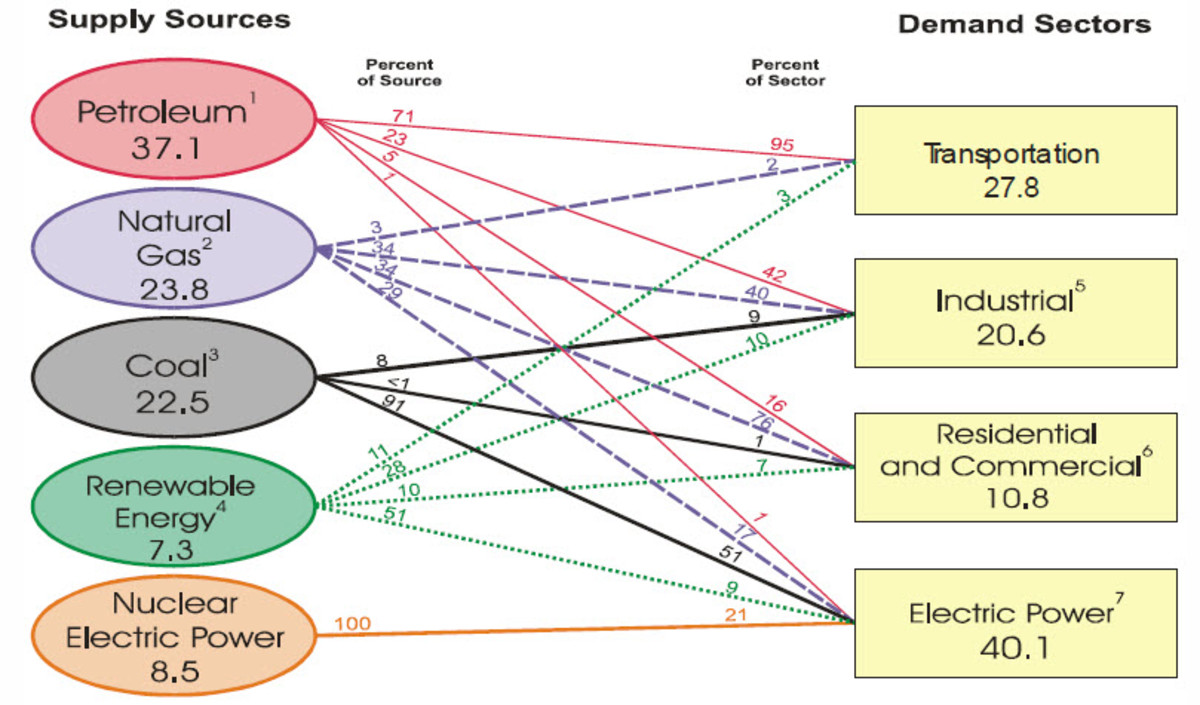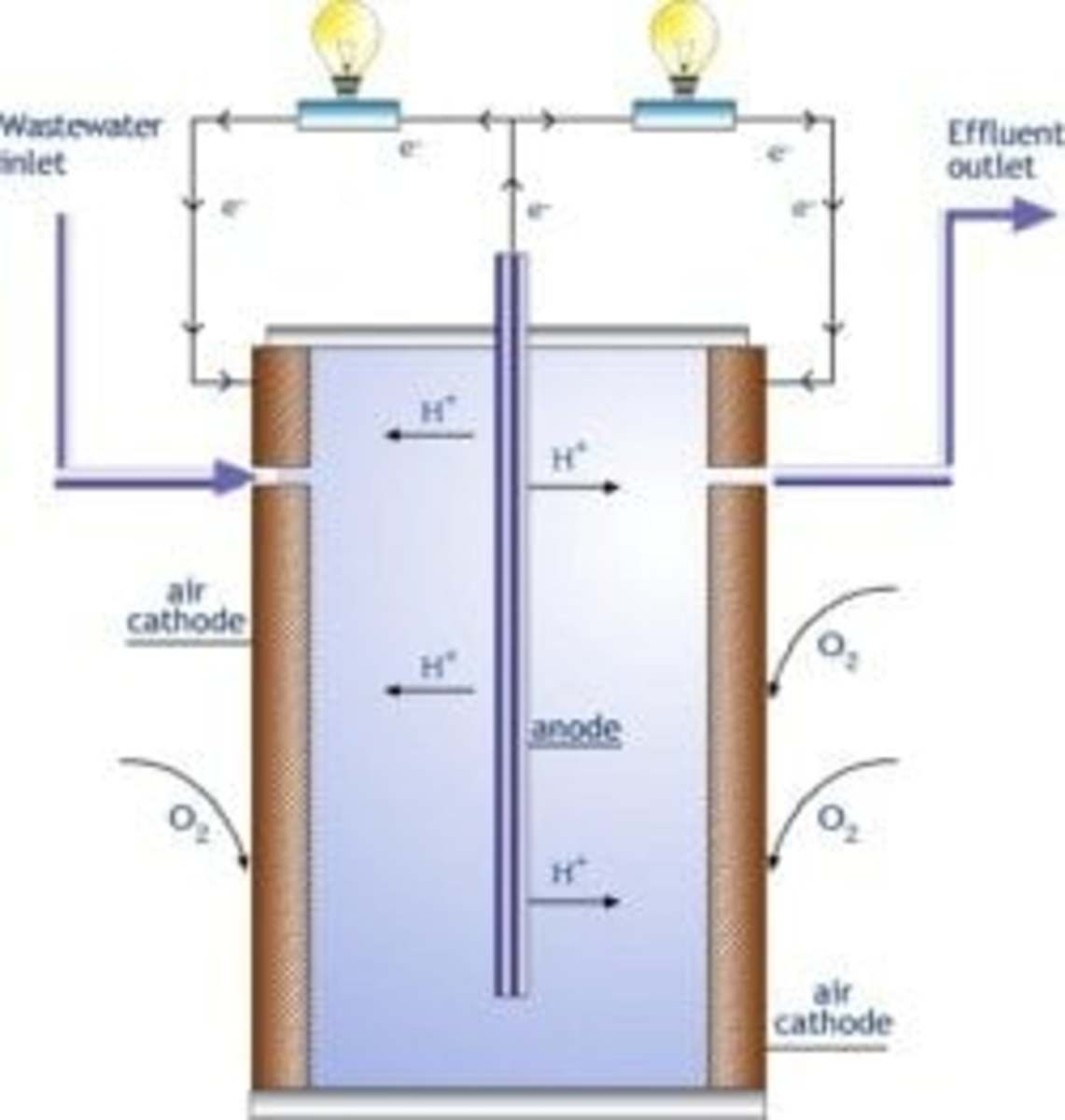Biofuels Pros and Cons - Pros and Cons of Algae Biofuel
Biofuels pros and cons

Biofuels pros and cons
Before we go to discuss about the pros and cons of Algae biofuel in particular let us look into the biofuels pros and cons in general.
Biofuel is a source of renewable energy that holds tremendous potential. These come from living materials, such as crops like soybeans and corn, plant waste, and even certain kinds of algae. Biofuels are most often used to power vehicles as an alternative to gasoline and diesel. While Biofuels have many advantages, they also have few disadvantages. lt can take a huge amount of energy to produce them, and they can divert farming efforts from feeding people. Following are a list of main biofuels pros and cons:
PROS
- Biofuels are renewable as these are produced from plants and other organic material, which can be replenished constantly;
- Biofuels are environment-friendly. They are less polluting than fossil fuels;
- Biofuels cause much less greenhouse gas emissions in comparison to the conventional types of transport fuels;
- Biofuels are the cheapest types of fuels available in the world;
- Some biofuels, like biodiesel, do not require any major change to the existing equipment for use;
- Biofuels like ethanol and biodiesel are better for car engines than fossil fuels. Even if not being used as the main fuel source, they can be used as additives to improve performance;
CONS
- Increased production of crops meant for biofuels mean less production of food crops. A reduced food production can increase the price which may lead to inflation;
- Cultivation for biofuel production needs more land. This is considered a major problem, as it may result in a loss of habitat for various species of plants and animals;
- Biofuels can take more energy to produce them than the energy they provide;
- Although there is not enough carbon dioxide emission that cause greenhouse effect, yet the burning of materials to produce biofuels emits considerable nitrous oxide to create a greenhouse effect;
Algae Biofuel pros and cons
Detailed study of Algae biofuel pros and cons has unveiled that despite various techno-economic challenges ahead as discussed in this post, the experts believe that biofuel from algae is the most safe and clean alternative fuel of the future. Algae biofuel has the potential to revolutionize the energy industry and play a major role in the world’s future hope for environment friendly alternative fuel although many technical and economic challenges have to be overcome to make it commercially viable.
With rising oil prices, increasing global energy demand and diminishing crude oil resources there has been an urgent need for search of a cheaper alternative to fossil fuels to fuel our economy. It is predicted that the day is not far off when biodiesel from algae would replace petroleum as a transportation and aviation fuel globally. The study has shown that in the next ten years the international market for biofuel from algae is poised for explosive growth. Let us now discuss about the algae biofuel pros and cons i.e what are algae,.
What are Algae - Algae Biofuel Pros and Cons
What are algae? Algae are organic plants that grow in aquatic environments which capture sunlight and carbon dioxide (CO2) to create 'biomass' through photosynthesis process. It has long been established that algae are potentially good source for biofuel production because of their comparatively high oil content and rapid bio-energy producing capability from sunlight. Biofuel from algae is the source of new green and clean renewable energy that is safer for the environment as well as for the human beings as compared to energy from petroleum based fuel. The growth rate of algae is fantastic and some strains of algae multiply the quantity of biomass almost four times in a single day. It is very efficient when it comes to algae oil extraction for converting to biodiesel. There are several advantages of using biofuel from algae as an alternative to fossil fuels.
- Use of oil extracted from algae instead of from fossil fuel means using an energy source which is renewable as against a source of fast depleting supply;
- In its growing process algae absorbs carbon dioxide from the environment which leads to lowering of atmospheric carbon dioxide level causing reduction in global warming;
- One of the major advantages of algae is that it has much higher yield of oil per acre of land (15/20 times) than any other competing bio-fuel producing plants like corn or sunflower;
- The greatest advantage of algae for producing biofuels over other plants is that this plant is not used for any food products. This gives benefit of lower price volatility to algae also;
- Algae being not an agricultural crop it can be grown in non-agricultural lands. The best type of algae to produce bio-fuel out of many types that have been used so far is that which we find on the surface of ponds or small bodies of water;
- Biodiesel from algae can be used in the diesel engines and in its fuel injection system with out any adverse effect on the operating performance of the engine. It is also found that algae bio-fuel gets better mileage than petroleum-based fuel;
- Biofuel from algae being an oxygenated fuel (enriched with oxygen), algae biodiesel makes fuel combustion more complete and results in carbon emission much lower than conventional diesel;
- Algae as bio-fuel can be used on all aircraft and engines don't need to be modified for this;
- Algae based bio-fuel can be used as a replacement or in a blended form with regular petroleum diesel with out any major engine modification;
- If used blended with the petroleum diesel in right proportion biodiesel from algae has been found to cause lower wear and tear of the engine than with regular diesel. It also shows superior lubricating properties and extends engine life;
- Biofuel from algae decomposes nearly 4 times faster than the conventional diesel fuel;
- Algae biodiesel has a higher ignition temperature i.e. flashpoint making it much safer than the conventional diesel where safety is concerned. The fuel is less likely to catch fire accidentally due its lower volatility and higher flashpoint;
Major drawbacks
- The algae biofuel production is highly dependent on availability of suitable climatic condition, substantial quantity of water, flat land, and carbon dioxide feed --all in one location;
- Study by experts has found that the capital and operating costs for environmentally friendly algae bio-fuel production process will continue to remain too expensive to be economically acceptable in the near-to-mid-term;
- A lot more R&D efforts are needed to deliver scalable, cost-effective technology with the aim to make production of algae biofuels less costly and to increase productivity to make it economically viable;
Market outlook
Study of biofuel pros and cons reveals that with its fewer drawbacks, biofuel from algae, is the most logical renewable energy source of the future alternative to fossil fuels. It is apparent from the market perspective that the following major challenges are yet to be met in order to achieve production of biodiesel from algae on commercial scale:
- To increase oil content of the existing strains of algae or to select new strains with higher oil content;
- To increase growth rate of algae;
- To develop a robust device/system with competitive capital and operating costs for growing algae either in open air or enclosed environment;
- To develop an efficient oil-extraction method;
- To develop co-products other than oil;
While discussing about algae biofuel pros and cons, it may be further mentioned that although there are companies and scientists who have already successfully tried biodiesel from algae to run vehicles but these efforts are not large enough to promote commercial production. The cost of production of biofuel from algae mainly depends on the methods of its cultivation. Research studies claim that on a rough estimate this cost comes to around $140 per barrel($3.50 per gallon) when algae is cultivated in open ponds while the cost is estimated to be around $500 per barrel($11 per gallon) when cultivated in a closed environment within a device called Photo-Bio-Reactor (PBR). Thus, it is apparent that open systems, such as cultivation of algae in ponds or small water bodies are currently more economical and practical method for algae cultivation. The experts predict that as a result of ongoing research on economical methods of algae cultivation and harvesting and with increased volume of production at economic scales, this fledgling fuel source could be cost-competitive compared to fossil fuels and both will cost same within the next ten years.
You might also like to read this related post: Pros and cons of Biofuels as an alternative source of energy
Conclusion
It would be evident from the biofuels pros and cons discussed in the forgoing paragraphs that the commercial viability of biofuel from algae is ultimately going to depend on scale economics. The potential investors should, therefore, start looking for business models that would look to biodiesel from algae as a potential energy source not only for the transportation market but also for other higher value products such as aviation bio-fuel, renewable jet fuel, bio-gasoline, ethanol, butanol, bio-methane etc. Fossil fuels lobbies are still too strong but as the fight against greenhouse gas emissions and climate change gain strength it looks like such pressure groups could soon lose some of their influence, which could eventually open the door for biofuel from algae to play a significant role into competitive global energy market.








